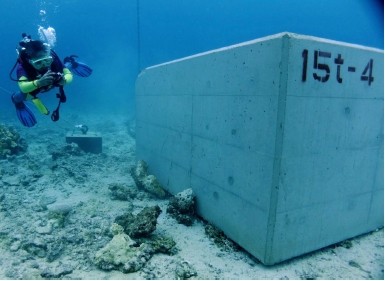US base construction: 20-ton concrete blocks destroy coral in Oura Bay

Concrete blocks damaged coral reef in Oura Bay, Nago, on February 8. (Photograph provided by the Diving Team Rainbow of the Helicopter Base Objection Association)
February 10, 2015 Ryukyu Shimpo
Concrete blocks, which the Okinawa Defense Bureau installed to secure floats and buoys, have hurt corals at several locations in Oura Bay, Nago. There, the governments of Japan and the United States are advancing work on a replacement facility for U.S. Marine Corps Air Station Futenma. Members of the Diving Team Rainbow of the Helicopter Base Objection Association confirmed this on February 1, 7, and 8.
“We may see dead corals next time, because they have been hurt so severely,” a member of the team said. They strongly condemned the construction work being carried out by the defense bureau.

An official from the fisheries division of the Okinawa Prefectural Government stated, regarding the damage to the corals, “The law does not require the procedures of prior consultation and permission to crush rock reefs, when the ships drop anchors. However, we will look into whether a new application from [ the defense bureau] should be required or not in this case.”
“I do not know where these photographs were taken,” an official of the defense bureau said. “We are not consulting with the prefectural government on this case, because they said last year the permission might not be necessary to install anchors to set floats within the construction zone.”
The members of Diving Team Rainbow have investigated five locations, including Abe and Sedake
Where large buoys and concrete blocks have been installed, the sea near the coast of Camp Schwab where large crane ships are anchored, and a channel nearby. There are concrete blocks weighing about 15-20 tons, sitting on coral rock on the seabed near Sedake and Abe. The coral rock was scraped and cut by the weight of the blocks.
Anchors installed to secure the buoys and floats have hurt the coral when waves dragged them during typhoons. One-hundred-and-twenty anchors have been lost so far. Environmental groups have warned against the installation of concrete blocks because it will compromise environmental protection and management.
(English translation by T&CT)
Previous Article:Large floating devices introduced in Henoko: 40 citizens hold a protest rally
Next Article:ACSILs demands an apology for annexation of Ryukyu, calling it a “Violation of International Law”
[Similar Articles]
- Corals destroyed in Oura Bay
- New damage found on coral in Oura Bay possibly due to Henoko relocation plan
- Okinawa Governor Onaga orders Japanese government to stop Henoko reclamation
- Coral community in Oura Bay damaged
- ODB begins submerging concrete blocks in Oura Bay to restrict Henoko base construction site
 Webcam(Kokusai Street)
Webcam(Kokusai Street)


